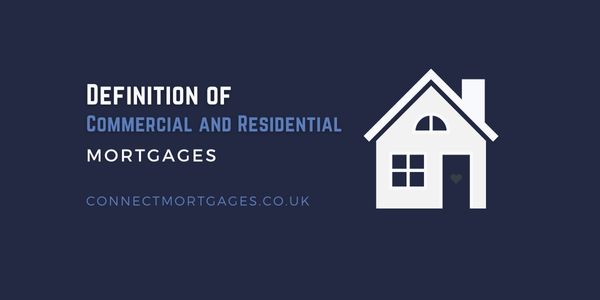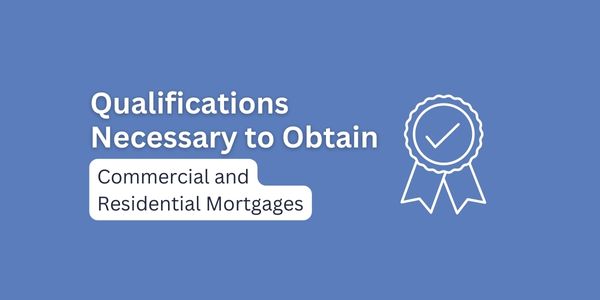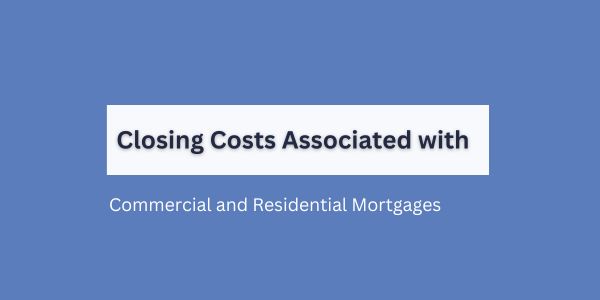Are you looking to purchase a commercial property or a residential home? Regarding financing, substantial differences between commercial and residential mortgages need to be considered.
In this guide, we will explore the differences between commercial and residential mortgages so that you can decide which is best for your needs. In addition, we will discuss eligibility requirements, loan terms, and rates.
By the end of this guide, you will better understand commercial and residential mortgages so that you can make an informed decision. So let’s get started!
Commercial Mortgage vs Residential Mortgages
When you hear the word “residential,” you may be able to tell that residential mortgages are loans secured on a property where you live. However, commercial mortgages, sometimes known as business mortgages, work differently. So, what’s the difference between residential and commercial mortgages? If this topic intrigues you, we’ve written guides below for further reading!
Guide 1: residential mortgage
Guide 2: Change Residential Mortgage to Buy to Let: A How-To Guide
A Commercial Mortgage, on the other hand, is mainly for business owners who want to buy property or land for commercial use, and the main difference between the two mortgages tends to be that the value of the land or property is usually much more significant if it’s for commercial use.
One of the benefits of a commercial mortgage is that you can rent out the property you’ve bought for extra income.
“Like a buy-to-let mortgage”, you might be thinking, in which case you would be correct. The difference here is the property is still regarded as a residential property. So if you buy a house intending to rent it to others, this is called an investment mortgage instead of a commercial, and it isn’t your principal residence.
But What Are the Other Differences?
- Unlike residential mortgages, commercial mortgages cannot be established as standard products due to the variety of lands and premises that can be used commercially.
- There are usually no fixed rates.
- As commercial mortgages are deemed a higher risk level to lenders, you must pay an increased interest rate.
- A commercial mortgage is more advantageous than a standard business loan, as the former requires collateral such as property to secure lower interest rates.
- A Commercial Mortgage will typically remain in effect for 1 to 15 years, while the duration of residential mortgages can extend up to 25 or 30 years.
- Regarding commercial mortgages, the highest borrowing available usually ranges between 65%-70% loan-to-value, whereas residential mortgages can extend up to an impressive 95%.
- There are no ‘3 times your salary’ rules for a commercial mortgage; every application will be very different.
- The Financial Conduct Authority regulates residential mortgages, while commercial mortgages enjoy the luxury of fewer restrictions.
- Residential mortgages present a much lower risk to lenders, resulting in an even more competitive market that makes obtaining one significantly less expensive.
- As commercial mortgage loans are frequently more extensive and the process more intricate, you must supply more information than is required for a residential mortgage.
Definition of Commercial and Residential Mortgages

Commercial Mortgage:
A commercial mortgage is a loan designed to purchase or refinance commercial property. This includes office buildings, warehouses, retail shops, and apartment complexes. The key difference between commercial and residential mortgages is how the property is used. Commercial mortgages fund business properties, whereas residential mortgages finance private homes.
Residential Mortgages:
Residential mortgages are loans used to purchase or refinance a home. These loans are often structured as fixed or standard variable-rate mortgages (SVR). Fixed-rate mortgages have a set interest rate throughout the loan term. SVRs have variable interest rates, which can change over time.
The terms of a residential mortgage depend on factors such as the loan amount, credit history, and lender requirements. Borrowers typically need a deposit of at least 5%, although this may vary by lender.
Residential mortgages are regulated by the Financial Conduct Authority (FCA) in the UK to ensure compliance with lending standards.
Differences in Loan Amounts: Commercial Mortgages vs Residential Mortgages
Loan Amounts for Commercial Mortgages:
Commercial and residential mortgage loan amounts can differ significantly. Commercial mortgages generally provide larger loan amounts than residential mortgages. Commercial properties tend to have higher values and need larger loans for purchase or refinancing.
The minimum loan amount for commercial mortgages is £25,001. There is no upper limit for loans with variable interest rates. The maximum loan amount for fixed rates can reach up to £10 million. However, the actual amount depends on the property type and other criteria the lender sets.
Loan Amounts for Residential Mortgages:
Residential mortgages usually offer loans between £25,001 and £5 million. Lenders limit the maximum amount they can offer, regardless of an applicant’s income or financial situation. Most lenders do not exceed £5 million for residential mortgages.
Deposit Requirements:
Commercial mortgage lenders typically require larger deposits than residential mortgage lenders. For commercial mortgages, deposits usually range between 20% and 40%, although various factors can influence this requirement. In contrast, residential mortgages often need a minimum deposit of 5%.
Types of Commercial and Residential Properties Eligible for Financing
Commercial Properties:
Commercial properties financed with commercial mortgages include office buildings, warehouses, retail stores, and apartment complexes. Lenders assess these properties based on size, condition, location, and revenue potential. Evaluations focus on whether the property can generate sufficient income for loan repayment.
Residential Properties:
Residential properties eligible for residential mortgages typically include houses and flats. Lenders assess these properties through inspections to confirm value and condition. The valuation helps determine whether the property can adequately secure the loan. Lenders also check if the sales price reflects the property’s true market value.
Qualifications Necessary to Obtain Commercial and Residential Mortgages

Qualifying for commercial and residential mortgages differs significantly. For a commercial mortgage, borrowers typically need a strong credit score, adequate income to meet repayments, and collateral to secure the loan. Most commercial mortgages also require a minimum deposit of 20%.
Residential mortgages usually demand good credit and sufficient income to cover repayments. However, criteria can vary between lenders. Most residential mortgage providers ask for at least a 5% deposit. Additional documentation may also be required, such as proof of employment or bank statements.
When reviewing applications, lenders assess the property’s condition, location, and potential income generation. They also evaluate borrowers based on credit scores and other financial indicators.
Interest Rates Associated with Commercial and Residential Mortgages
The interest rates associated with commercial and residential mortgages can vary significantly. Generally, commercial mortgage interest rates tend to be higher than residential mortgages.
Interest rates are due to the more significant loan amounts and the risk associated with commercial properties. On the other hand, residential mortgages usually have lower interest rates. This is because these loans offer more flexible repayment options and may be available with longer loan terms.
Commercial Mortgage:
- Generally, higher interest rates are due to more significant loan amounts and greater risk.
- It may require borrowers to have a balloon payment at the end of the loan term.
Residential mortgages:
- Low-interest rates
- More flexible repayment options with longer loan terms
Repayment Term on Commercial and Residential Mortgages
Repayment terms on commercial and residential mortgages can also vary significantly. Commercial mortgages tend to have shorter repayment periods, usually in the range of 5-15 years. Commercial mortgages are considered riskier than residential ones, so lenders require them to be paid off more quickly.
Residential mortgages often have more extended repayment terms. For example, these loans can be repaid over 30 years, which allows borrowers to make monthly payments.
Commercial mortgages:
- Shorter amortisation periods of 5-15 years
- They are considered riskier, so lenders require them to be paid off quicker.
Residential mortgages:
- The more extended repayment terms of up to 30 years
- Less risky than commercial mortgages
The Loan to Value for Commercial and Residential Mortgages
Lenders utilise the loan-to-value ratio to determine the amount of a loan that can be offered relative to an asset’s value. For example, a standard commercial mortgage loan of up to 75% is available without requiring extra collateral. However, if you have additional security in the form of real estate or other property, you can get a loan on a value as high as 100%.
On the other hand, residential mortgages usually have higher LTV ratios. This is because these loans typically require a lower deposit from the borrower, and many lenders will only lend up to 95% of the property’s value.
In both scenarios, it must be said this is subject to meeting individual lenders’ requirements and criteria.
Improving Your Loan-To-Value Ratio
There are some ways you can improve your loan-to-value ratio. These may apply for commercial or residential purposes. Either way, increase your property’s equity, so you don’t need to borrow as much.
You can do this by:
- Saving more towards your deposit
- Pushing for a lower price on the property than the seller is asking
Closing Costs Associated with Commercial and Residential Mortgages

Commercial mortgages:
More than just focusing on the purchase price is required when considering commercial property investments. Taxes and operational expenses must also be accounted for to ensure your budget encompasses all costs associated with buying a commercial property.
The following fees form part of the guidance only;
- Stamp duty land tax
- Business rate
- Renovation and building works
- maintenance costs
- legal cost
- Lenders fee
- Brokers fee
Residential mortgages:
Acquiring a property can be intricate and involved, requiring serious deliberation of various costs beyond the purchase itself.
The property’s price tag is, without a doubt, the most considerable expense. Most people will finance this purchase with a combination of their deposit and mortgage money from the lender unless purchasing it outright.
The following fees form part of the guidance only;
- Mortgage product fee
- Broker fee
- Legal fees
- Valuation fee
- Arrange fees
- Stamp duty land tax
- Buildings and content insurance cost
- Mortgage protection cost
Regulation of Commercial and Residential Mortgage Lenders by Government Entities.
When applying for a commercial mortgage, borrowers can choose from high-street banks, challenger banks, or specialist commercial mortgage lenders. High-street banks often provide the lowest interest rates. However, they tend to have stricter eligibility criteria and may be less flexible with repayment terms. Lending by these institutions is generally authorised by the Financial Conduct Authority (FCA).
In the United Kingdom, residential mortgages fall under the oversight of two regulatory bodies: the Financial Conduct Authority (FCA) and the Prudential Regulation Authority (PRA). The FCA regulates homeowner mortgages, lifetime mortgages, and equity release schemes designed to support older borrowers facing financial challenges.
Commercial Mortgages:
Most commercial mortgages are unregulated. An exception applies if 40% or more of the property secured against the loan is used for residential purposes.
Residential Mortgages:
Lenders must assess whether the borrower can repay the full loan amount. Applications are only approved if the repayment is deemed affordable.
Key Differences:
Commercial and residential mortgages differ significantly in terms of regulations and eligibility requirements. Understanding these differences can help borrowers choose the right type of mortgage for their needs. Awareness of these details ensures borrowers make informed decisions about property investments.
Final Thought
When choosing between commercial and residential mortgages, assessing the differences in costs, regulations, and suitability is important. Each option carries distinct advantages and disadvantages, so borrowers should carefully evaluate what best meets their needs.
Deciding between commercial and residential mortgages requires thorough consideration. Commercial mortgages often cater to business purposes, whereas residential mortgages are designed for personal property purchases. Borrowers must assess their financial goals before proceeding.
Commercial mortgages typically involve higher deposits and stricter lending criteria. They are suited for business investments, property development, or rental income. Residential mortgages, however, are geared towards personal homeownership and generally have lower interest rates.
Borrowers should review their financial circumstances and long-term plans. Consulting a qualified mortgage advisor can provide clarity and ensure compliance with UK lending standards. Understanding the key differences can help secure the most suitable mortgage option.
Whether opting for commercial or residential mortgages, making informed decisions based on affordability and purpose is vital. Evaluating terms and conditions early can prevent unexpected issues later.
Thank you for reading our “Commercial Mortgages vs Residential Mortgages | Explore Now ” publication. ” Stay “Connect“-ed for more updates soon!






